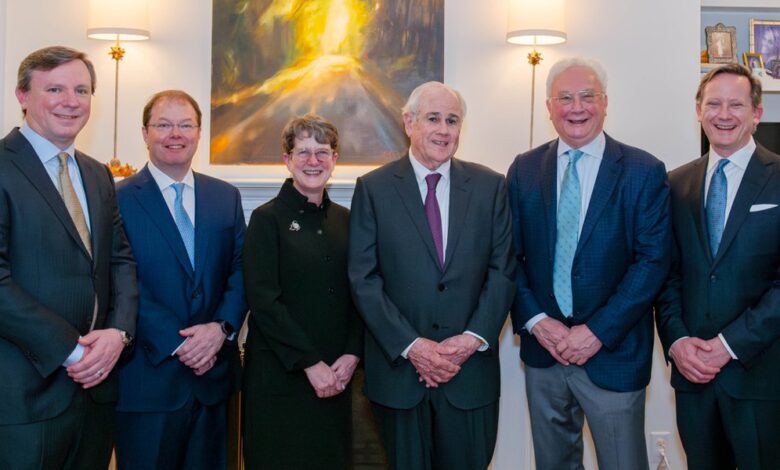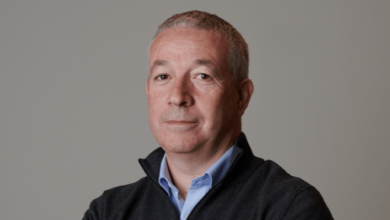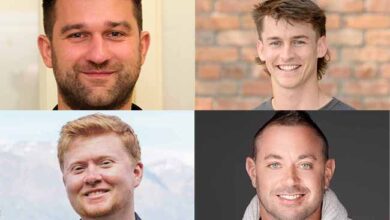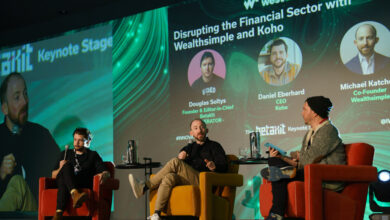Meet the 2024 Honorees of the Society of Entrepreneurs

Formed in 1991, the Society of Entrepreneurs recognizes the historical importance of the contributions of individuals who have, over a prolonged period, demonstrated a gift of entrepreneurship and used this gift to not only create or build a successful business but have also used their gift in service to the community.
The organization’s newest inductees represent the entrepreneurial spirit in their approach to risk and resolution. Whether they’ve started a business or entered into a family enterprise, they’ve had to find the groove that propels them not just to making it, but to taking their endeavors above and beyond the usual metrics of success.
The society also honors one of its members with the Master Entrepreneur designation. This year, it’s Robert G. McEniry, former chairman of nexAir.
The 2024 inductees are Chris Brubaker of Progressive Technologies; Fred, Brett, and Justin Grinder of Grinder, Taber & Grinder, Inc.; and Stacy McCall of ServiceMaster by Stratos. They will be officially inducted into SOE at the 32nd Annual Dinner and Awards Banquet on April 20, 2024, at the FedEx Event Center at Shelby Farms.
Robert McEniry — Master Entrepreneur
nexAir
NexAir is a three-generational company acquired by Robert McEniry’s father in 1950. McEniry worked there in high school and college and joined the firm in 1963. He became president of the company in 1971 and chairman/CEO in 1996. It was a time of acquisitions, mergers, start-ups, and joint ventures and in his 60 years with the company, revenues and expansion grew substantially. His son, Kevin, took over as CEO in 2007, developing the company to an industry powerhouse. When it was sold in 2023, the company had more than 75 locations and 725 employees.
The company supplies packaged and bulk atmospheric gases for medical, metal fabrication, construction, and research applications. It is also a distributor of gas-related equipment including specialized medical equipment, welding equipment, and related supplies.
Did you want to go into your father’s business?
McInery: I wasn’t sure that I really wanted to go into this business, so I kind of came in with misgivings, maybe thinking I would go somewhere else. My father wasn’t a big proponent of forklifts or air conditioning or tailgates on trucks, which would make things easy, but I did come in and found the business to be pretty exciting. The products that we had were very interesting and also very productive. And the applications of our products filled just a smorgasbord of industries. Consequently, I fell in love with the business.
How did you find your role in the business?
If you study entrepreneurial businesses, the first generation is generally that economic dynamo that does everything. When I went to work for my dad, he once went out of town and suddenly told me I was in charge for a week. I tried to be him, but that is not my style. He was the dynamo. He did everything and I realized he probably needed some help and I think he needed me, but if anything happened to him, I really was in trouble. But I saw the opportunities for the business were greater than me, so I went about trying to recruit my own group.
What do you look for in people you work with?
I found that what a person you’re really looking for in business, especially if you’re going to be dealing with a lot of people, is a well-rounded person. Somebody that understands psychological and sociological history, interestingly enough.
What’s your advice to someone who wants to start a business?
I want to make sure they’ve got a unique product and a good financial background or have somebody backing them. There’s a lot of people that try to get into business that ought to first work for a company. You can be entrepreneurial in a company like nexAir without starting the company. People that really get ahead are people that take ownership of a particular situation and say, okay, that’s my project, I’m going to do it. And then they’ve got some background or proof that they can do it.
What are the strengths of Memphis as an entrepreneurial town?
We’re in the center of the country. We don’t have a lot of base industry here, but we have the distribution industry. This is where all the railroads cross. This is where all the highways cross. We’ve got the river. And of course we’ve got a wonderful airport and we’ve got relatively good weather. The people that have run some of these large companies are not only dedicated to making good business decisions and running good businesses, but they were invested in the community itself. They made sure that their employees were invested in the community. There’s a soul to Memphis that has created some great opportunities.
Stacy McCall
ServiceMaster by Stratos
I was a Delta girl and I liked rocks, so why not become a petroleum engineer if you like rocks?”
That made perfect sense to Stacy McCall of Greenwood, Mississippi, who went to Mississippi State University to do just that. She got that degree and enjoyed working on offshore rigs in the Gulf of Mexico, flying in helicopters, laboring crazy hours, and getting in some hands-on participation. She didn’t quite realize that was all training to become an independent business owner.
That came later when she went in on ServiceMaster Clean and ServiceMaster Building Maintenance franchises with her husband in Tuscaloosa, Alabama. And from there, McCall kept up the pace. Moving to Columbus, Mississippi, and then to Memphis, she became chief financial officer and then CEO and president and oversaw rebranding in 2010 to ServiceMaster by Stratos.
McCall is a past president of NAWBO Memphis and sits on the Boy Scouts of America Chickasaw Council and the Le Bonheur National Leadership Council for Le Bonheur Children’s Hospital. Previously, she was a commissioner for Memphis City Beautiful and treasurer for the Memphis in May International Festival.
In an interview about her induction into the Society of Entrepreneurs, she spoke about her journeys.
How did you find it coming to Memphis?
McCall: It was an opportunity to experience a community that really had a vested interest in you, the business community here. It was like they wanted to introduce you to someone else. They wanted you to make a connection. They wanted you to succeed, which was fertile ground for me to say, “Hey, not only could I do this, but maybe I can buy a building. Maybe we could start an event venue, maybe we could connect in deeper ways with the community.”
How do you give back to the community?
An example would be our River Arts festival that happens every year. We donate time and energy to help an organization like that put on the event. But what it does when we do that is our people get to experience the event itself. Also, they love seeing the craftsmen; they love to see the artwork.
Name a great learning tool.
The school of hard knocks has been really a wonderful tool for us to use to learn from our escapades and hopefully not repeat the same mistake twice.
What are the strengths of your leadership?
At the beginning we were learning the processes and the products and all of that. Then slowly but surely I realized that we were in a people business and that the biggest investment that we could make is in our people. We have developed a culture in the organization that drives every decision for employment or bringing someone into the organization. Now, I have to say we home-grow our people into positions within the organization. And the first line of defense in taking care of our people is making sure that those that we bring to our organization and within our organization have the same philosophy and care for our people that we do.
A young person with entrepreneurial dreams comes to you for advice. What do you say?
You’re going to have to be comfortable in the uncomfortable when you start. And who is going to be your support system? Do you have family? Do you have business associates? Who are you going to surround yourself with? Who are you developing relationships with that when it gets tough, you can call on? This is not a lone ranger kind of activity. You have to have a tribe. What are you doing to develop that tribe so that when the going gets tough, you have those that will have your back, that will provide a stake in the sand, some compass, your North Star?
How many employees do you have?
ServiceMaster by Stratos, our flagship here in Memphis, has 150 employees, but we call them our service partners because they’re partners in service to the customer. Now we have the same in our Reno, Nevada, area. We have over 140 service partners operating out there too.
What does the future hold?
I don’t see obstacles, I see opportunities, and that’s an entrepreneur. And so right now at Stratos, the opportunities that exist for us to move into even more activities. And that’s one thing, as the market moves, we have the opportunity to move because we are a continuous learner organization and we’re always looking forward to what is happening in the marketplace that’s new, so that we can innovate and be part of that new adventure in the local marketplace.
Chris Brubaker
Progressive Technologies, Inc.
When Brubaker’s father bought Progressive Technogies, they talked about Chris coming into the enterprise. The young man was in college and had plans to get into accounting, which he did, working at Deloitte for several years.
But his father got cancer and the two had a heart-to-heart talk about what to do. Young Brubaker was 26 and had a big decision to make. He agreed to come into the company, acquiring it a couple of months before his father died.
Brubaker discussed his decision and his road to leadership in an interview for his induction into the Society of Entrepreneurs.
What was your situation at that time?
Brubaker: I came into a business where I had maybe worked a couple of hundred hours in the field as a college student and just started working really hard. I spent a lot of days, almost every day, at [my father’s] bedside while he was living, just trying to soak up knowledge. From 1997 until now, it’s just been a heck of a journey, a great career. What my father gave me was a good work ethic and the confidence that he thought I could figure it out. He had an incredible reputation. So, there were people that I think in hindsight probably took pity on me and said, “We’ll continue doing business with this kid that doesn’t know anything.”
What does Progressive Technologies do?
We are a low-voltage and systems-specialty contractor, which is one of those things people do that everybody realizes somebody has to do it, but nobody really knows who it is. We started in the cabling business — telephone and computer cabling and fiber-optic backbones — and have moved into security cameras, building access control, paging systems, school intercom, wi-fi, fire alarm, any sort of burglary. It’s all commercial and industrial. We’ve got another group that does a very specific building management system installation in the cloud data market. We’re in offices in Memphis, Little Rock, Rogers, Arkansas, and Dallas, Texas. And then we have a group that does data center work all over the country. We sort of pick up and set up shop for a year and a half to two years and then go to the next one.
What’s your advice to someone who comes to you and wants advice on starting a business?
I am going to ask them what their risk tolerance is. When I started this, I had no responsibilities, and I continue to have a pretty high risk tolerance, but you’ve got to make sure that they understand the commitment. I worked seven days a week for a lot of years. I’m not saying that was the right thing to do, but I didn’t have a lot to work with. You’ve got to have a drive, you’ve got to have a work ethic, you’ve got to have a good idea, and you’ve got to be able to inspire people, attract talent, and treat them right.
There are a lot of moving parts that can make a business successful. And it’s all people. You’ve got to build customer relationships and that’s got to be based on trust, quality work, product, or whatever it is you happen to be doing. It’s not a journey for everybody, but for the right folks, I think it’s a really rewarding way to spend a career.
What do you look for when you are looking at a potential hire?
Our joke has always been, if you need to be managed, you probably don’t need to come here. We hire really good people, pay them well, get out of their way, and give them the tools they need to be successful in their career. I have competitors that are very system-driven, very regulated. There’s a process for every little thing, and that works wonderfully for them but it doesn’t work for us. We’ve been a much more aggressive sort of cowboy-up mentality. Let’s go figure out how to grow and attract really good people and provide a really good product and experience with our customers.
What is it about Memphis that makes it a good place for entrepreneurs to thrive?
I think Memphis is a town full of characters, and that’s what I love about it. We have no shortage of risk-takers. I think it’s just an incredible place to have been fortunate enough to grow up and still call home. There’s just something in the water that pushes people to do fun, great things.
Fred, Brett, and Justin Grinder
Grinder, Taber and Grinder, Inc.
As a leading construction firm, Grinder, Taber and Grinder is operating with both the second and third generations at the helm. Fred Grinder’s father and uncles got the company going and he witnessed the creation of some of the area’s most significant buildings, such as Memphis City Hall and the 100 North Main Building. Fred, like his father before him, introduced his sons, Brett and Justin, to a life in construction and they’ve been building some of the most iconic structures in Memphis.
The brothers both went to Georgia Tech, and both worked in Atlanta after college and soon after brought the experience home.
How did you get started in the business?
Fred: The company was founded in 1968, my senior year in high school, and I worked there, part-time through college and then full-time in 1973. I had the good fortune of working side by side with my Dad. I’m proud that I and my two sons are carrying the legacy on and we’re sole owners now.
Justin: We were taught that engineers were the problem-solvers, so we always wanted to get into this business. I fondly remember my grandfather would pick us up on weekends and we’d go check out job sites. We learned by observing and saw the work ethic as he talked to subcontractors. And Dad taught us the financial side of the business. We always wanted to do it.
Brett: We grew up in Memphis and both of us went to Memphis University School. Our family always had a great respect for engineers and were told we should get an engineering degree.
What’s something you do that keeps you on your toes?
Brett: I’ve had different perspectives on every problem I’ve come across watching my father and grandfather. They had different approaches and different things to offer and they gave me the freedom to grow the business. I’ve learned to be quiet in meetings and pay attention to our clients because we work with some of the greatest business minds in Memphis, from the medical to the financial to the educational fields.
What’s your advice for prospective entrepreneurs?
Fred: With a young startup, you’d better know what you’re doing and have a business plan that makes sense. Have a passion for it. Most startups have low capital and nobody in the city knows them, but that’s an obstacle you can overcome if your business plan makes sense and can be profitable. Don’t be deterred by setbacks. Keep fighting.
Brett: Work for the very best and surround yourself with these people for as long as you can. And once you’re ready, jump in with both feet.
Justin: Stick to your knitting. Be the best in your specific industry. Don’t try to expand and do a bunch of different things all at once.
What’s your corporate culture like?
Brett: We have a culture of technical competence. We look to see if a prospective employee has an engineering or design degree or expertise so when they’re working with our construction engineers they already have that mindset. Everybody wants to do continuous development themselves, so we have a culture of constant learning.
Justin: We’re open to change. We’re constantly changing our methods and becoming more efficient every day. If you’re not open to technical advances in the construction industry, then you probably won’t progress very far.
How do you find the best people?
Brett: In addition to their degrees, we look for people who can read and write really well. We can teach you how to build a building and build an estimate, but we can’t teach you good grammar or the soft skills you might need.
What’s your vision for the future of the company?
Brett: Ever since Crosstown Concourse [opened] and what’s happened in the past decade is a great trajectory. We’re a people business and I don’t think we’re going to be interrupted by artificial intelligence. We want to have all our people in one place so we can be there.
Are entrepreneurs born or taught?
Fred: You’re molded by the people around you. I’ve seen entrepreneurs whose children are not capable of carrying on a second generation. But I’m here with two individuals who are third-generation leading this company to the biggest heights it’s ever had. So, I think it’s a little bit of both.
What was your most challenging project?
Justin: My favorite is the Paul Barret Jr. Library at Rhodes College, because it was such a challenging project. It’ll be there to stand the test of time. It’s astounding when you walk in the doors. It’s a beautiful building.
Brett: The absolutely most challenging project right now is the Brooks Museum project downtown. It’s like building a Swiss watch. You couldn’t get that building built in a prior life without the technology we have today.



